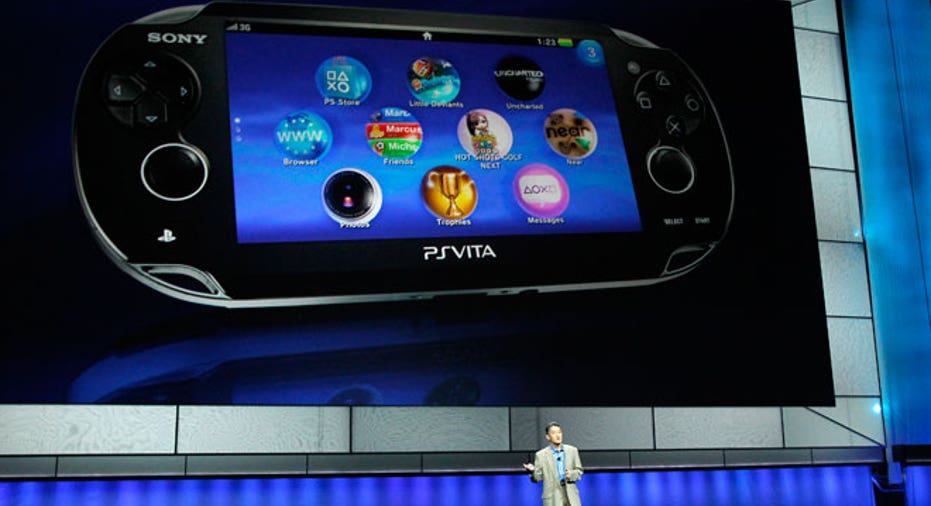Sony Unveils New PlayStation Device, Seen Expensive

Sony Corp (NYSE:SNE) unveiled the pricing of its new PlayStation Vita handheld games device at a flashy Los Angeles event and immediately ran into criticism the gadget was too expensive.
The show featured appearances by sports and rock stars and was a bid by the electronics giant to move on from the computer hacking attacks that forced it to shut down its videogames network for almost a month.
The new device is aimed at competing with the likes of Apple's iPod Touch and the plethora of smartphones and tablets on the market. After the device was first unveiled in January, the show on Monday revealed other details, including the name and basic price.
It will go on sale for $249, or $299 for a 3G mobile version, in time for year-end holidays, the Japanese electronics giant's No.2 executive Kazuo Hirai told reporters.
"That's fine for core gamers who want to play games all the time, but it's too expensive for the mass market," said Dan Ernst, a Hudson Square research analyst.
The prices in Japan will be 24,980 yen and 29,980 yen, while in the euro zone the gadgets will cost 249 euros or 299 euros, roughly level with Nintendo's 3DS, a 3D handheld gaming device launched earlier this year.
The Sony event was held on the eve of the E3 games convention, the industry's annual get-together that draws 45,000 reporters, analysts and industry types to a convention centre the size of eight football fields.
Hirai drew some groans from the audience of several thousand when he said Sony would work with U.S. telecoms firm AT&T as the exclusive carrier for the Vita.
Many users of Apple's iPhone in the United States have complained that AT&T provided poor connectivity.
The Sony show included appearances by Kobe Bryant, who demonstrated a basketball simulation game, followed by DJs, dancers and rock band Jane's Addiction.
The upbeat tempo of the event marked a stark contrast to Hirai's appearance on May 1 at a Tokyo news conference, when he bowed deeply and repeatedly to show Sony's contrition for the security breach of its networks.
HACKERS
In April, hackers accessed personal information on 77 million PlayStation Network and Qriocity accounts, 90 percent of which are registered in North America and Europe.
At the time, Sony said credit card information may have been stolen, sparking lawsuits and casting a shadow over its plans to combine content and hardware products via online services.
A further blow to Sony's online services could come from Apple, whose boss Steve Jobs unveiled remote computing services earlier the same day, as it sought the lead in the fast-expanding new market.
Nobody has claimed responsibility for the April attack on Sony.
The company later revealed hackers had stolen data from 25 million users of a separate system, its Sony Online Entertainment PC games network, in a breach discovered on May 2.
Just last week, hackers claimed they had broken into servers that run Sony Pictures Entertainment websites and had accessed the information of a million customers.
Sony managed to restore the PlayStation Network in full in its main North American and European markets ahead of E3, which runs from June 7-9.
Jack Tretton, the head of the company's U.S. videogames division, apologised to users of the network and software makers over the incident, but joked that media should thank Sony for providing a story.
He added that activity on the PlayStation network was back up to 90 percent of what it had been before the security breach and that last week's PlayStation sales were up 27 percent on a year earlier.
"We learned a lot during the recent outage of PlayStation Network," Hirai said. "One of the most important things we learned was about the trust and loyalty of our customers."
Restoring services quickly was seen as essential because connectivity is one of the main selling points of the Vita.
For serious gamers, the ability to take up games where they left off, even while they are away from home, could be a key differentiation point from main rival Microsoft , which does not offer a portable device.
The global games market is expected to grow to $65 billion this year, up from $62.7 billion in 2010, although signs of weakness in the U.S. economy have sparked concern about prospects for the sector.



















